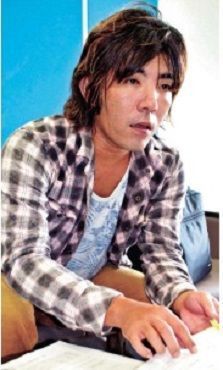ODB still deciding damages for now deceased victim of 2008 taxi robbery by U.S. servicemen

On September 15 at the Ryukyu Shimpo Newspaper Building, Muneyuki Ura lays bare his resentment for the nine full years that reparations have not been paid.
September 16, 2017 Ryukyu Shimpo
Two U.S. servicemen robbed and beat a taxi driver on January 7, 2008 in Mihara, Okinawa City.
Although it has been more than nine years since the incident, on September 15 this year it came to light that reparations have not yet been paid to the victim of the crime.
According to the Okinawa Defense Bureau (ODB), this is because the Japanese government’s examination regarding compensation is still ongoing.
The taxi driver’s lawyer Tsutomu Arakaki says that this progress is “excessively slow.”
He thinks that the ODB is not sufficiently attentive toward helping his client.
The perpetrators of this crime were a U.S. Marine corporal and another young serviceman.
At the time of the incident they were 20 and 19 years old, respectively.
While stealing the taxi driver’s cash they assaulted him with an alcohol bottle, causing lacerations on his head and spraining his neck.
The two servicemen were arrested on the charges of robbery and inflicting injury, were indicted, and both received prison sentences.
According to the victim’s eldest son, 32-year-old Muneyuki Ura, his father suffered from PTSD.
In 2012 his father died from illness, with reparations to him still unpaid.
On September 12, Muneyuki submitted a written inquiry to the ODB.
According to the ODB’s reply on September 15, the victim’s representing lawyer submitted letters demanding damages be paid on five occasions between May 2009 and October 2014.
The damages demanded in these letters totaled around 22,500,000 yen (about 225,000 USD).
In the case of U.S. servicemen causing incidents while off-duty, should the perpetrators be unable to make a settlement outside of court, the ODB will examine the victim’s claims and produce a written report. The U.S. government will then review the report and decide on the amount of consolation money to be paid.
The 1996 Special Action Committee on Okinawa (SACO) agreement established that should the consolation sum decided by the U.S. government be less than the sum of damages determined in the Japanese civil suit, the Japanese government will be in the position to pay the difference.
However, the ODB’s reply to Muneyuki noted that in order to calculate damages, the ODB needs specific confirmation of the victim’s condition, and has been waiting for medical institution-provided diagnoses.
Its reply also noted that at the time the ODB indicated to the victim’s lawyer which medical certificates the bureau lacked, and had requested that the lawyer submit this documentation.
The ODB explained that the Japanese government’s examination is ongoing.
Arakaki, the victim’s lawyer, said that in the claims he has been involved with, “Normally [damages] are paid within two years.
” Speaking about the ODB requesting medical papers, he also said: “It would be one thing if [the victim] was still undergoing treatment, but upon his death the ODB should have conducted its own investigation.”
Muneyuki said: “My father was concerned about the unpaid reparations until the end.
How long does he have to wait?”
(English translation by T&CT and Erin Jones)
Previous Article:OPG opens Shimakutuba Promotion Center
Next Article:ODB April to July study shows heavy nighttime and foreign burden out of 18,799 Kaenda flights
[Similar Articles]
- U.S. government to provide compensation payment to taxi driver robbed and injured by military servicemen
- Asbestos victim’s lawsuit: government to pay 18.75 million yen to family of Okinawan worker on U.S. military base
- War victims in South Sea Islands file lawsuit against government
- Civilian victims of Battle of Okinawa file PTSD medical certificate in damage suit against government
- Ex-U.S. military base worker convicted of rape and murder of woman in Okinawa will not appeal life sentence, officially ending legal proceedings
 Webcam(Kokusai Street)
Webcam(Kokusai Street)


